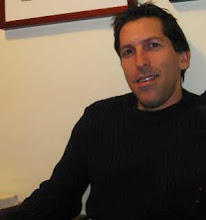In class we discussed Sarat Maharaj's article: ‘Know‐how and No‐How: stopgap notes on “method” in visual art as knowledge production'. While it could have been written less densely, it raised some ideas about whether we do artistic research as a way to legitimize art to the larger society. Looking at how science does research to see how artist might
use it better is a valuable notion and perhaps there is a connection between the domains of artistic and scientific research.
Are we seeking to add knowledge, or challenge paradigm (dialectic thinking). Of course both artists and scientists can do both. Here is a quick poem on the subject
I wonder if we approach research
as a patient that's sickened
or an exorcist excising those
Strickened
with incorrect (blashephemous) ideas
quickening interest
afraid of doubts and fears?
Not channels, like the ancient seers
or yet - perhaps that's the rub
we think we know what's both up
and sub.
ancient mariners blindly sailing off the edge of reality.
the mapmaker creates the world with same stroke
stroke of insight
Self, meets self
delight.
Does science have an agenda with research (and does, the artist too)
as we see in part two
artist had an agenda that grew
Maybe we have capitalist bent
oriented toward
individualism
or dualistic view of the Lord and
think ourselves heaven sent?
Though perhaps art alone
like play (so not alone)
can have no agenda
unless you say to seek inspiration/surprise
is agenda-full
and social value?
exterior hull
inside there's nothing?
And that'd be science's game
Part 2
We discussed Denise Ziegler, ‘Features of the Poetic. The Mimetic Method of the Visual Artist’,
-->
Mimesis is not mimicry!
The Romans copied it wrong from the Greeks,
but we know not why.
Plato spoke of mimetic art as representation of an idea.
Aristotle says that altering the details of the reconstruction you have
transformative power and make it more real. By speculating how things might be,
you change the facts slightly – poetic license as we say today – and it can become more true.
Wheras Plato and Aristotle spoke of narrative, Ziegler's wild insight is use it beyond narrative. Yet she wrote, “The purpose of mimetic
reiteration is to distance the situations from personal
experience and thereby to facilitate the selection process.”
But, as she also wrote, " The purpose of mimetic representation
is, according to Aristotle, to awaken aesthetic pleasure in the
viewer. This pleasure is achieved by adhering to the mimetic model based on
evoking certain emotions, namely fear and pity, and their
subsequent catharsis."
So, where was the catharsis in Zielger's work? If it was there, she didn't spend much time describing it. Leaves me wondering if she did follow Aristotle's advice, to alter it a bit and then your reconstruction is more real (or seems more real) than the original. She said "Processed into a work of art and
dissociated from their everyday context, these “undefinable gestures” and their
traces can evoke feelings of strangeness, conflict or hilarity... It is my contention that these
emotions facilitate the experience of a special kind of catharsis. Works of
“undefinable gesture” function in that way in compliance with the requirements for tragedy defined by Aristotle.
Was Aristotle a limiting factor or
helped her? Did she use for legitimizing? Was it kind of slapped on. But it does seem a brilliant idea - mimesis on non-narrative... so even if her
execution didn’t have catharsis which for Aristotle the whole purpose to have a catharsis - still her idea is valuable.
I mean did plants racing in pots or sitting at a conference table have catharis? Did it relate to the original context? Did she reveal deeper
truth? But again, a cool idea to have mimesis outside drama and thus here work is (via the essay) a contribution to
other artists even if her execution maybe failed. She didn’t say much about the
catharsis so we don't know.
What was the greater truth about plants?
Without a new name she is judged by his criteria so maybe a new name like "Zielgesis".
Spent so much time about the theory and Aristotle, not much
on what she did.
Maybe Minimalism, like Romans, feel insecure.
But being a minimalist, perhaps better to be silent?
some random links and ideas...
When faced with a why question the best we can do is say "shhh..."
as in don't trouble your mortal mind with suh things
and paradoxically
all answers found in silence.
but of course we say answers found in science
and mystery in science is defined by the term
X
but as per this TED talk, it's X because you can't say "shhh" in Spanish
http://www.ted.com/talks/lang/en/terry_moore_why_is_x_the_unknown.html
and my own research
http://www.skytopia.com/project/fractal/mandelbrot.html#best
http://hacknmod.com/hack/infrared-head-tracking-for-the-wii/


0 Comments:
Post a Comment
Subscribe to Post Comments [Atom]
<< Home